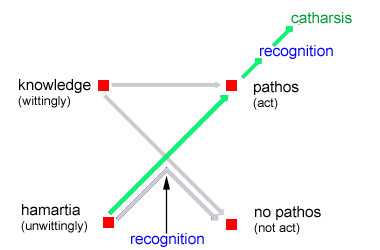
7) catharsis

The final ingredient in the mix is the catharsis. This process involves some reassessment of the fatal act that allows for it not to be categorized as an act of pollution; placing a permanent stain on the character of the perpetrator of the act. In effect, the deed, which appears to be an abhorrent act, is revealed instead to be a catastrophic mistake. In legal terms, the reevaluation moves the fatal deed from the category of unjust actions (ἀδικήματα) to that of actions committed in error (ἁμαρτήματα). To a limited extent, this legal distinction mirrors the distinction we have inherited from English common law between first-degree murder and manslaughter. First-degree murder is presumed to involve premeditation (malice prepens), implying that the fatal act has been thought out and planned in advance; thus involving complete awareness of the nature of the act and its implications. Manslaughter, on the other hand, is impulsive, and presumed not to involve careful forethought or consideration. Interestingly enough the judgment of manslaughter rather than first-degree murder in Elizabethan English courts allowed for a person to be subject to a royal pardon. In functional terms, the process of catharsis in Greek tragedy is somewhat equivalent to allowing the possibility of a pardon, with the exception of the fact that the it is harder to come by and takes place over a longer period of time.
 Sophocles' Oedipus Rex provides us with some insight into the legal process. Prior to his investigation into the murder of Laius, Oedipus assigns a punishment for the murderer: death or exile. In either case, the intention is to rid Thebes of the pollution brought upon the perpetrator of the violent act and his family as a result of his or her deed. When Oedipus eventually discovers the murderer to be none other than himself, the audience is likely to feel that the sentence deserves some reconsideration, given the circumstances under which the murder was committed. In effect, they consider that the stain of the act can be washed from the murderer's character, and that he or she could be considered a good person who is the victim of unfortunate circumstances; but nonetheless a good person.
Sophocles' Oedipus Rex provides us with some insight into the legal process. Prior to his investigation into the murder of Laius, Oedipus assigns a punishment for the murderer: death or exile. In either case, the intention is to rid Thebes of the pollution brought upon the perpetrator of the violent act and his family as a result of his or her deed. When Oedipus eventually discovers the murderer to be none other than himself, the audience is likely to feel that the sentence deserves some reconsideration, given the circumstances under which the murder was committed. In effect, they consider that the stain of the act can be washed from the murderer's character, and that he or she could be considered a good person who is the victim of unfortunate circumstances; but nonetheless a good person.
Catharsis is, then, the process by which we consider that the stain on a person's character that would naturally be caused by a violent act is not appropriate. The act is eventually no longer judged as polluted (μιαρόν), but rather purified (καθαρόν), as the word "catharsis" suggests.
In part, this reevaluation is triggered by the sudden suffering manifested by the perpetrator at the moment his or her error is discovered. Typically, however, the pollution will not be purged until the tragic character undergoes both an extended period of suffering and formal acts of contrition such as the one Orestes undergoes at the shrine of Apollo in Delphi or, in a less formal process, wandering for years in exile, as in the case of Oedipus or Agave. While the nature of the catharsis involves a legal judgment, that judgment is overshadowed by its psychological overtones. We are left with a sense that the stain of the character's violent deed is one that can be removed, and that he or she is fundamentally a good person who erred as a consequence of extraordinary circumstances that might just as well have caused us to act as they did, had we experienced them. In effect, we, as audience, become the agents of the pardon to be conferred on the tragic hero, and we enjoy the rewarding satisfaction of granting that relief.